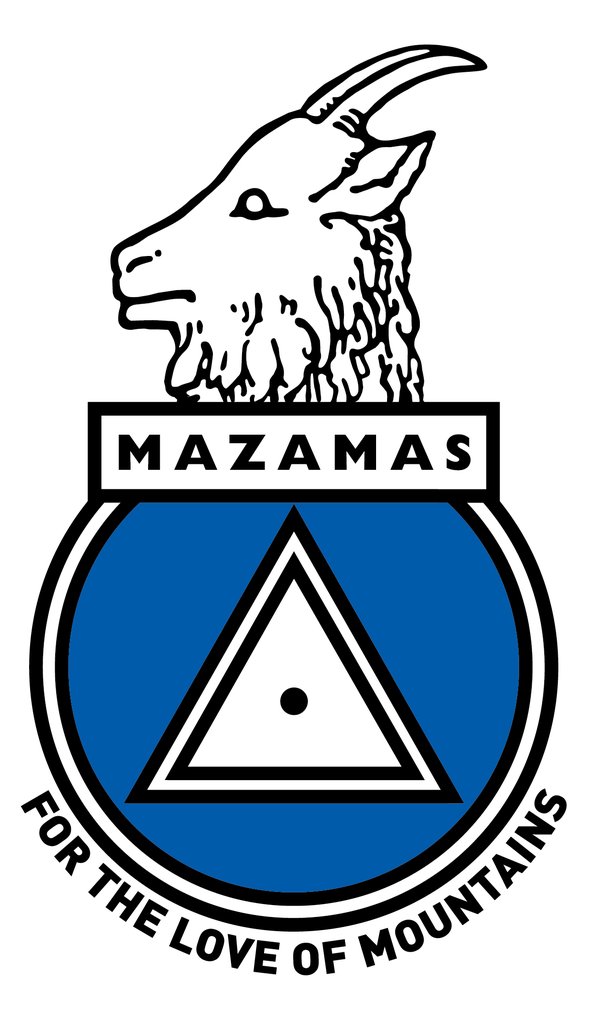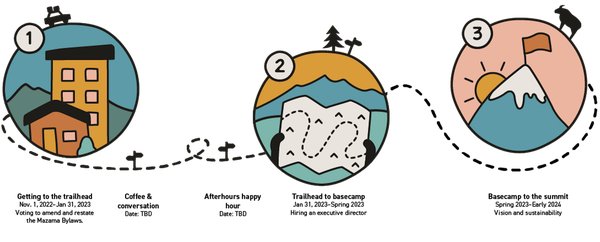AMENDED AND RESTATED BYLAWS OF THE MAZAMAS
SECTION 1: PURPOSE
The Mazamas is a nonprofit public benefit corporation organized and operated to engage in any lawful activity permitted by Section 501(c)(3) of the Internal Revenue Code. In particular, the Mazamas shall promote mountaineering, climbing safety, and the exploration of the alpine environment, specifically in the Pacific Northwest, by providing educational and training opportunities related to mountaineering and the alpine environment; collecting, preserving, and disseminating scientific information, memorabilia, data ,and knowledge concerning the same; supporting the conservation and preservation of the natural environment; and providing and promoting climbing, hiking, outings, expeditions, and other activities.
SECTION 2: MEMBERSHIP
2.1 Classes of Membership.
The Mazamas shall have one class of members.
2.2 Requirements and Voting Rights.
Members may be admitted upon application and approval of the board of directors (the “board”). Any person who supports the mission of the Mazamas shall be eligible for membership. Members shall have the right to vote on only the following matters: (a) the election and removal of directors, and (b) a merger, dissolution, or sale, lease, conveyance, exchange, or other disposition of substantially all property owned by the Mazamas.
2.3 Dues.
Dues are established by the board and may include discounts or waivers for prospective members based on the status of a prospective member, including as a student, youth, or senior. Admission to and continuation of membership are contingent upon payment of dues, and any person who has not paid dues for a membership term shall automatically cease to be a member.
2.4 Transfers.
Memberships are nontransferable and shall terminate upon the death, resignation, or termination of the membership.
2.5 Suspension and Expulsion.
The board, by unanimous vote, may suspend or expel a member. Any such suspension or expulsion must be fair and reasonable and carried out in good faith, provide 15 days’ notice stating the reasons for suspension or expulsion, and provide an opportunity not less than five days before the effective date of the suspension or expulsion for a member to be heard orally or in writing by a person authorized to withdraw the proposed suspension or expulsion.
SECTION 3: MEETINGS OF THE MEMBERS
3.1 Annual Meeting.
An annual meeting of the members shall be held during the first quarter of the year or at a time and place designated by the board. At the annual meeting, the president or other board member shall report on the activities and financial condition of the Mazamas, and the members shall consider any matter that is consistent with the description of issues to be considered in the notice for the annual meeting.
3.2 Special Meetings.
The Mazamas shall hold a special member meeting upon the call of the board or upon the request of at least five percent of the voting power of the members who sign, date, and deliver to the Mazama Secretary a written demand for the meeting and describing the purpose of the meeting. The board shall set the date of the meeting and send out notice within 30 days of the date of the written demand.
3.3 Participation.
The board may permit members to participate in an annual or special meeting by remote communication. A member participating in a meeting in accordance with this section is, for the purposes of transacting any official business, present in person at the meeting.
3.4 Notice of Meetings.
The Mazamas shall provide 10 days’ notice for all member meetings if given by first-class mail or private carrier, or seven days’ notice if delivered orally or electronically. All notices must give the date, time, and place of the meeting and a description of any matters that the members must approve. Notice for a special meeting must also include a description of the purposes for which the meeting was called.
3.5 Waiver of Notice.
A member may at any time waive any notice required by these bylaws. Except as provided in the preceding sentence, any waiver must be signed and in writing and may be a document that is transmitted electronically. A member’s attendance at or participation in a meeting waives any objection to lack of or defective notice, unless the member, at the beginning of the meeting, objects to holding the meeting or transacting business at the meeting.
3.6 Quorum.
Unless the articles of incorporation or bylaws require a higher quorum, the votes represented at a meeting constitute a quorum. A member is considered present regardless of whether the member votes or abstains from voting.
3.7 Voting.
Unless the articles of incorporation or bylaws require a greater vote, if a quorum is present when a vote is taken, the affirmative vote of a majority of the votes that are represented at such meeting and voting at such meeting is an act of the members.
SECTION 4: DIRECTORS
4.1 Powers.
The board of directors (the “board”) shall exercise, or delegate or otherwise authorize the exercise of, all corporate powers and shall direct the management of the affairs of the Mazamas, subject to any limitation set forth in the articles of incorporation, these bylaws, and Oregon law. The board shall retain authority over an exercise of corporate powers that the board delegates or authorizes under this section.
4.2 Dissolution; Merger; Disposition of Assets.
A merger, dissolution, or sale, lease, conveyance, exchange, or other disposition of substantially all of the property owned by the Mazamas must be approved by the board of directors and the members.
4.3 Qualifications.
All directors must be individuals 18 years of age or older and must meet the qualifications described in Section 4.6. Directors need not be residents or citizens of the State of Oregon or of the United States of America.
4.4 Number.
The board shall consist of a minimum of nine and a maximum of 13 persons. The number of directors may be fixed or changed periodically within the minimum and maximum by the board.
4.5 Tenure of Office.
Directors serve for terms of three years. Directors may serve for a maximum of two consecutive terms. After at least one year off the board, a director who has previously served one or more terms under this section may be elected to a new term. The board shall arrange for terms to be staggered such that not all of the directors’ terms expire in the same year.
4.6 Election.
Nine of the directors shall be elected by members at the annual meeting of the members and shall have been a Mazama member for at least three years cumulatively. Up to four directors may be elected by the board and need not be members.
4.7 Resignation.
A director may resign at any time by delivering written notice to the president or the secretary. A resignation is effective when notice is effective under ORS 65.034 unless the notice specifies a later effective date. Once delivered, a notice of resignation is irrevocable unless revocation is permitted by the board.
4.8 Removal.
A director may be removed, at any time, with or without cause, by majority vote of the members or by the board. In each case, the members or the board may only remove a director at a special meeting. The notice for such a meeting must state that the purpose of the meeting is to remove one or more directors.
4.9 Vacancies.
A vacancy shall exist if the actual number of directors is less than the maximum number for any reason. A vacancy on the board may be filled by election by the members or by the board pursuant to Section 4.6. The term of a director elected during the year to fill a vacancy shall begin as of the date specified in the resolution to elect the director. Each director so elected shall hold office for an initial term specified in the resolution to elect the director, in order to arrange for terms to be staggered. If the board accepts the resignation of a director tendered to take effect at a future time, a successor may be elected to take office when the resignation becomes effective.
4.10 Executive Committee.
The board shall have an executive committee, which shall be a board committee that may exercise the authority of the board as described in Section 4.11. The executive committee shall be composed of the president, vice president, immediate past president, secretary and treasurer; the board or the president may also appoint at-large directors to serve on the executive committee. Only directors shall be voting members of the executive committee. The president shall preside at the executive committee meetings. Between meetings of the board, the executive committee shall have and exercise all the authority of the board in the management of affairs of the Mazamas, except as limited by Section 4.11. At least 24 hours’ notice shall be required to convene a meeting of the executive committee.
4.11 Other Board Committees.
In addition to the executive committee, the board may create one or more board committees that exercise the authority of the board. The creation of a board committee and either the appointment of directors to the board committee or the designation of a method of selecting board committee members must be approved by the board. Each board committee must consist of two or more directors, who serve at the pleasure of the board. Only a director may serve as a voting member of a board committee. Except as may be contemplated by resolution of the board, the provisions of these bylaws governing meetings, action without meetings, notice and waiver of notice, and quorum and voting requirements of the board shall apply to committees and their members as well. The board may delegate the authority of the board to a board committee; provided, however, no committee may:
Authorize the payment to a person from the income or assets of the Mazamas, other than a payment of reasonable value for property received or services performed or payment of benefits that further the purposes of the Mazamas;
Approve dissolution, merger, or the sale, pledge, or transfer of all or substantially all of the assets of the Mazamas;
Elect, appoint, or remove directors or fill vacancies on the board or on any board committees;
Adopt, amend, or repeal the articles of incorporation or bylaws; or
Appoint or remove officers.
4.12 Nominating Committee.
The nominating committee shall be an advisory committee of the board of directors, as described in Section 4.14, that assists the board with its governance responsibility by identifying and proposing individuals for election to the board. The nominating committee shall consist of at least two directors and the board may appoint members to serve on the nominating committee. The nominating committee shall provide the board with a list of names of persons who the nominating committee has vetted and recommends for election to the board.
4.13 Finance Committee.
The finance committee shall be an advisory committee of the board of directors, as described in Section 4.14. The finance committee shall be composed of the treasurer and at least two other directors appointed by the president. The board may appoint additional individuals, who need not be directors, to the finance committee. The treasurer shall preside at the finance committee meetings. The finance committee shall be responsible for developing and reviewing fiscal procedures and the annual budget, which shall be presented to the board for approval.
4.14 Advisory Committees.
In addition to the nominating committee, the board may create one or more advisory committees. The board may appoint individuals to serve on an advisory committee or specify a method for selecting members. Members of these committees need not be members of the board, but at least one director shall serve on each such committee. Advisory committees shall have no power to act on behalf of, or to exercise the authority of, the board, but may make recommendations to the board or to board committees and may implement board or board committee decisions and policies under the supervision and control of the board or a board committee.
4.15 Member Committees.
The board may create one or more committees comprised of members. The board may appoint individuals to serve on such member committees or specify a method for selecting members. Member committees shall have no power to act on behalf of, or to exercise the authority of the board, but rather shall focus on various aspects of the operation of the Mazamas in furtherance of its purpose.
4.16 Compensation.
Directors shall not be compensated for service in their capacity as directors or officers. A director may receive reimbursement of actual reasonable expenses incurred in carrying out their duties as a director.
4.17 Director Conflict of Interest.
A conflict of interest transaction is a transaction with the Mazamas in which a director of the Mazamas has a direct or indirect interest, as defined in ORS 65.361. The board shall adopt a policy that (a) requires directors, officers, and key employees to disclose any interest that constitutes or could result in a conflict of interest and (b) sets out procedures for reviewing and resolving such matters in accordance with the law.
SECTION 5: OFFICERS
5.1 Designation.
The officers of the Mazamas shall be a president, a vice president, an immediate past president, a secretary, a treasurer, and such other officers as the board shall appoint. The board shall elect the president, vice president, secretary, and treasurer from among the directors. The immediate past president shall be the person who served as president during the prior term, if that person remains on the board. The board may hire an executive director. The same individual may not serve simultaneously as president, secretary, or treasurer.
5.2 Election; Term of Office.
Officers shall be elected by the board at the annual meeting for a term of one year (or such other term as the board may designate) unless sooner removed and may be elected to any number of consecutive terms. The executive director shall serve in such office for as long as they are employed by the Mazamas as executive director.
5.3 Removal.
Any officer may be removed, either with or without cause, at any time by action of the board.
5.4 Resignation.
An officer may resign at any time by delivering notice to the board, the president, or the secretary. A resignation is effective when the notice is effective under ORS 65.034 unless the notice specifies a later effective date. If a resignation specifies a later effective date and the Mazamas accepts the later effective date, the board may fill the pending vacancy before the effective date if the board provides that the successor does not take office until the effective date. Once delivered, a notice of resignation is irrevocable unless revocation is permitted by the board.
5.5 President.
The president shall preside at meetings of the board and meetings of the members, shall serve as the president of the executive committee, shall ensure that the board is advised on all significant matters of the business of the Mazamas, shall oversee member communications, and shall be responsible for overseeing the plans and directives of the board. The president also shall have such other powers and perform such other duties as may be prescribed by the board. If the president remains on the board after their term, they shall succeed to the role of immediate past president.
5.6 Vice President.
The vice president shall preside at meetings of the board at which the president is absent and in the absence of the president shall have the other powers and perform the other duties of the president. The vice president also shall have such other powers and duties as may be prescribed by the board.
5.7 Immediate Past President.
The immediate past president, if any, shall work with the president and other officers to ensure a smooth transition and continuity of the board programs and policies. The immediate past president also may have such other powers and duties as may be prescribed by the board. If the person who served as president during the prior term no longer remains on the board, then such person may attend board meetings as a non-voting observer.
5.8 Secretary.
The secretary shall prepare minutes of meetings of the board and authenticate records of the Mazamas. The secretary shall keep or cause to be kept at the principal office or such other place as the board may order, the minutes of all board meetings. The secretary also shall have such other powers and perform such other duties as may be prescribed by the board.
5.9 Treasurer.
The treasurer shall lead the board’s oversight of the budgeting and planning process, financial performance, and financial condition of the Mazamas. The treasurer shall keep and maintain, or cause to be kept and maintained, adequate and correct books and records of accounts of the properties and business transactions of the Mazamas. The treasurer shall have such other powers and duties as may be prescribed by the board.
5.10 Executive Director.
The executive director shall serve at the pleasure of the board and shall, subject to the oversight of the board, have general supervision, direction, and control of the business and affairs and day-to-day management of the Mazamas, and shall manage the communications with members. The executive director shall have the executive powers and duties of management usually vested in the office of chief executive officer of a corporation. The executive director shall not, by virtue solely of their employment as executive director, be a member of the board, although they shall attend all board meetings unless excused by the president.
SECTION 6: MEETINGS OF THE BOARD
6.1 Meetings.
An annual meeting of the board shall be held during the first quarter of the year or at a time and place designated by the board. The board may meet as frequently as necessary to conduct business for the Mazamas, but shall meet at least quarterly. If the time and place of any other directors’ meeting is regularly scheduled by the board in a manner that informs all directors of the time and place without additional notice, the meeting is a regular meeting. All other meetings are special meetings of the board. The board may hold annual, regular, or special meetings in or out of the State of Oregon.
6.2 Participation.
The board may permit any or all of the directors to participate in an annual, regular, or special meeting by, or conduct the meeting through the use of any means of communication by which each director participating in the meeting can communicate with all of the other directors simultaneously. A director participating in a meeting in accordance with this section is, for the purposes of transacting any official business, present in person at the meeting.
6.3 Call and Notice of Meetings.
The annual meeting must be preceded by at least 10 days’ notice if given by first-class mail or private carrier, or 48 hours’ notice if delivered orally or electronically. Notice of regular meetings may be made by providing each director with the adopted schedule of regular meetings for the ensuing year, and without further notice of the date, time, place, or purpose of the meeting. Special meetings of the board must be preceded by at least 24 hours’ notice and must be delivered orally or electronically. All notices must give the date, time, and place of the meeting. Except as specifically provided in these bylaws or applicable law, the notice need not describe the purposes of any meeting. The president, the secretary, or one-third of the directors then in office may call and give notice of a meeting of the board.
6.4 Waiver of Notice.
A director may at any time waive any notice required by these bylaws. A director’s attendance at or participation in a meeting waives any required notice to the director of the meeting unless the director, at the beginning of the meeting or promptly upon the director’s arrival, objects to holding the meeting or transacting business at the meeting and does not thereafter vote for or assent to any action taken at the meeting. Except as provided in the preceding sentence, any waiver must be in writing and may be a document that is transmitted electronically. The waiver must be signed by the director entitled to the notice, must specify the meeting for which the notice is waived, and must be filed with the minutes or the corporate records.
6.5 Quorum.
A quorum of the board shall consist of a majority of the number of directors in office immediately before the meeting begins. A director is considered present regardless of whether the director votes or abstains from voting.
6.6 Voting.
If a quorum is present when a vote is taken, the affirmative vote of a majority of the directors present when the action is taken is the act of the board except to the extent that the articles of incorporation, these bylaws, or applicable law require the vote of a greater number of directors. Each director has one vote and may not vote by proxy.
6.7 Presumption of Assent.
A director who is present at a meeting of the board when corporate action is taken is deemed to have assented to the action taken unless:
The director objects at the beginning of the meeting, or promptly upon the director’s arrival, to holding the meeting or transacting the business at the meeting;
The director’s dissent or abstention from the action taken is entered in the minutes of the meeting; or
The director delivers written notice of dissent or abstention to the presiding officer of the meeting before its adjournment or the Mazamas immediately after adjournment of the meeting. The right of dissent or abstention is not available to a director who votes in favor of the action taken.
6.8 Action Without Meeting: Vote by Email.
The board may, without a meeting, use email or other electronic means to take action required or permitted to be taken at a board meeting if:
The Mazamas has a record of an email address for each director;
The Mazamas sends to the email address of each director an announcement that the board will take action, a description of the matter on which the board will take action, and a deadline of not less than 48 hours after the time the Mazamas sends the announcement in which a director may vote; and
The majority of directors who hold office at the time vote in the affirmative, except to the extent that the articles of incorporation, these bylaws, or applicable law require the vote of a greater number of directors.
A director may change their vote at any time before the deadline set forth in the email announcement. The board’s action is effective on the deadline specified in the email announcement unless the announcement specifies a different effective date or time. The Mazamas shall include the email announcement and a record of the directors’ votes in corporate records reflecting the action that the board took.
6.9 Action Without Meeting: Unanimous Written Consent.
Any action required or permitted to be taken at a board meeting may be taken without a meeting if the action is taken unanimously by all directors. The action must be evidenced by one or more written consents describing the action taken, signed by each director, and included in the minutes or filed with the corporate records reflecting the action taken. Action taken under this section is effective when the last director signs the consent unless the consent specifies an earlier or later effective date. For purposes of this section, an affirmative email sent by a director in response to a written consent is deemed to be in writing by the director. A unanimous written consent under this section has the effect of a meeting vote and may be described as a meeting vote in any document.
SECTION 7: NONDISCRIMINATION
The Mazamas shall not discriminate in providing services, hiring employees, or otherwise, upon the basis of gender, gender identity, race, creed, marital status, sexual orientation, religion, color, age, national origin, veteran status, or disability.
SECTION 8: INDEMNIFICATION
The Mazamas shall indemnify to the fullest extent permitted by the Oregon Nonprofit Corporation Act any person who is made, or threatened to be made, a party to an action, suit, or proceeding, whether civil, criminal, administrative, investigative, or otherwise (including an action, suit, or proceeding by or in the right of the Mazamas), by reason of the fact that the person is or was a director, officer, employee, or agent of the Mazamas. The Mazamas shall pay for or reimburse the reasonable expenses incurred by any such person in any such proceeding in advance of the final disposition after the board of directors has taken such action as required by ORS 65.404, including providing notice of the proposed indemnification to the Attorney General. No amendment to this Article that limits the obligation of the Mazamas to indemnify any person shall have any effect on such obligation for any act or omission that occurs prior to the later of the effective date of the amendment or the date notice of the amendment is given to the person. This Article shall not be deemed exclusive of any other provisions for indemnification or advancement of expenses of directors, officers, employees, agents, and fiduciaries that may be allowable under any statute, bylaw, agreement, general or specific action of the board of directors, vote of the members, or other document or arrangement.
SECTION 9: GENERAL PROVISIONS
9.1 Amendment or Restatement of Bylaws.
The board may amend or restate these bylaws by majority vote, provided, however, that any amendment of these bylaws relating to the election or removal of directors, or affecting the rights of the members must be approved by a majority vote of the members at an annual or special meeting. The date of approval of any amendment to the bylaws or a restatement of the bylaws shall be noted in the corporate records.
9.2 Inspection of Books and Records.
All books, records, and accounts of the Mazamas shall be open to inspection by the directors and members in the manner and to the extent required by law.
9.3 Checks, Drafts, Etc.
All checks, drafts, and other orders for payment of money, notes, or other evidences of indebtedness issued in the name of or payable to the Mazamas shall be signed or endorsed by such person or persons and in such manner as shall be determined from time to time by resolution of the board.
9.4 Deposits.
All funds of the Mazamas not otherwise employed shall be deposited to the credit of the Mazamas in those banks, trust companies or other depositories as the board, or officers of the Mazamas designated by the board, may select, or may be invested as authorized by the board.
9.5 Loans or Guarantees.
The Mazamas shall not borrow money and no evidence of indebtedness shall be issued in its name unless authorized by the board. This authority may be general or confined to specific instances. Except as explicitly permitted by ORS 65.364, the Mazamas shall not make a loan, guarantee an obligation, or modify a preexisting loan or guarantee to or for the benefit of a director or officer of the Mazamas.
9.6 Execution of Documents.
The board may, except as otherwise provided in these bylaws, authorize any officer or agent to enter into any contract or execute any instrument in the name of and on behalf of the Mazamas. Such authority may be general or confined to specific instances. Unless so authorized by the board, no officer, agent, or employee shall have any power or authority to bind the Mazamas by any contract or engagement, or to pledge its credit, or to render it liable for any purpose or for any amount.
9.7 Insurance.
The Mazamas may purchase and maintain insurance on behalf of an individual against liability asserted against or incurred by the individual who is or was a director, officer, employee, or agent of the Mazamas, or who, while a director, officer, employee, or agent of the Mazamas, is or was serving at the request of the Mazamas as a director, officer, partner, trustee, employee, or agent of another foreign or domestic business or nonprofit corporation, partnership, joint venture, trust, employee benefit plan, or other enterprise; provided, however, that the Mazamas may not purchase or maintain such insurance to indemnify any director, officer, or agent of the Mazamas in connection with any proceeding charging improper personal benefit to the director, officer, or agent in which the director, officer, or agent was adjudged liable on the basis that personal benefit was improperly received by the director, officer, or agent.
9.8 Fiscal Year.
As of the date of the adoption of these bylaws, the fiscal year of the Mazamas shall begin on the first day of October and end on the last day of September in each year. Beginning on January 1, 2024, the fiscal year of the Mazamas shall begin on the first day of January and end on the last day of December each year.
9.9 Severability.
A determination that any provision of these bylaws is for any reason inapplicable, invalid, illegal, or otherwise ineffective shall not affect or invalidate any other provision of these bylaws.
* * * * *
The Mazama Board of Directors approved a motion to accept and forward to the membership, for a vote, the preceding, restated bylaws on September 28, 2022.












